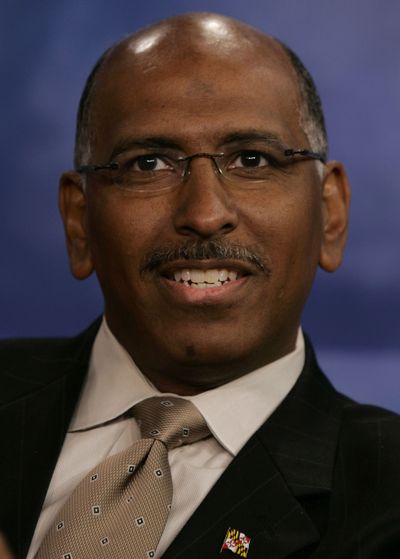GOP chief Michael Steele drops re-election bid
Wisconsin’s Reince Priebus elected chairman

OXON HILL, Md. — Embattled GOP Chairman Michael Steele dropped his re-election bid today amid declining support as the Republican National Committee, coming off huge election victories but facing a $22 million debt and an internal war over the party’s identity, voted to elect a new chairman.
“I will step aside because I think the party is ready for something different,” Steele told the 168-member committee after losing ground over four rounds of balloting.
Wisconsin GOP Chairman Reince Priebus (Ryns Pree’-bus) won the election to be chairman of the RNC. He surpassed the 85 necessary votes in the seventh round of balloting today.
Former Michigan GOP chairman Saul Anuzis and GOP operative Maria Cino came in second and third. Priebus will serve for the next two years.
Steele called for the party to be unified as it seeks to topple President Barack Obama in 2012.
“Despite the noise, despite the difficulties, we won,” he said, noting huge gains in November’s elections that included the GOP taking control of the House. “We must go forward, and we must win. We fired (Nancy) Pelosi. Let’s take the Senate. Let’s take the White House.”
Cino is a New York native and a veteran party operative who served in President George W. Bush’s administration. Saul Anuzis, a former chairman of the Michigan Republican Party.
A telegenic though gaffe-prone party leader, Steele had argued that he should be re-elected because of the GOP’s record of coast-to-coast victories while he was chairman last fall. However, Republican operatives formed a network of outside groups that adopted traditional national party functions out of a concern about the RNC’s ability under Steele to raise money and deploy resources to key races.
The chairman’s job includes serving as the leading spokesman promoting the party’s agenda and countering that of Democrats, raising money to help Republicans win in the next elections, and improving a get-out-the-vote effort that critics say languished under Steele.
Most urgently, the new chairman must retire an RNC debt of about $22 million owed to vendors and banks, as well as lure back demoralized donors who have been so frustrated with Steele’s management that they sent their dollars elsewhere or didn’t open their wallets at all last year. The party had only about $1 million cash on hand at year’s end.
The next leader also will have to figure out how to navigate a GOP civil war in which conservatives and tea party disciples are trying to pull the Republican Party even further to the right, to the chagrin of moderates and some longtime establishment leaders.
The first black chairman of the Republican Party, Steele was elected to a two-year term in January 2008 just as Obama — the country’s first black president — was taking office.
Since then, Steele, the former lieutenant governor of Maryland, has spent much of his tenure fending off criticism. He faced frequent complaints about questionable spending, anemic fundraising, staff shake-ups and cringe-inducing comments.
Longtime establishment Republicans and GOP elders in Washington argued that he damaged the party’s image and its long-term fiscal health.
Steele angered them by predicting the GOP wouldn’t win House control last fall; Republicans did win. He also drew their ire when he criticized fellow Republicans in a book that GOP leaders didn’t know he was writing until it was published.
He lashed out at critics, telling them to “get a life.” Steele also drew fire for collecting payments for his speeches.
Demands for him to resign came last year after the disclosure that RNC money was spent on a $2,000 tab at a sex-themed California night club, and when he said that the 9-year-old conflict in Afghanistan was a mistaken “war of Obama’s choosing.” It began under Bush.